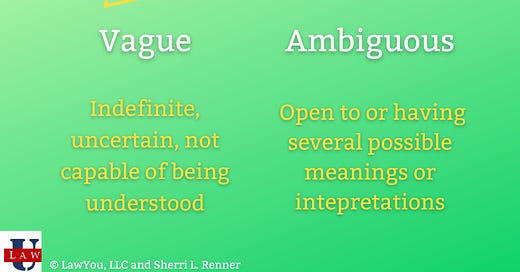Precision in Prose: Vague vs Ambiguous
The most valuable of all talents is that of never using two words when one will do.
-Thomas Jefferson
In civil rights-type litigation, we often encounter the phrase, "vague and ambiguous" as a descriptor. Here's a common example:
This law should be declared unconstitutional because it is vague and ambiguous.
The definitions of "vague" and "ambiguous" are different, however, and have different meanings in the legal context.
Vague
A statute can run afoul of the constitution if it is "vague," which means the law's prohibitions are not clearly defined. Under the "vagueness doctrine" or "void for vagueness doctrine," a law violates due process if it does not fairly inform a person of what is commanded or prohibited. The principle can be the basis for striking down laws that insufficiently warn people of what conduct is unlawful or that do not provide explicit standards for enforcement. Without notice of what is prohibited, enforcement can become arbitrary, capricious, and therefore discriminatory.
Ambiguous
Language is ambiguous when it is reasonably capable of being understood in more than one sense. If different meanings can be found in a statute or a term used in a statute, or when good arguments can be made for either of two contrary meanings, a law is said to be ambiguous.
Ambiguities sometimes do not become apparent until a law is enforced. Ambiguous laws can suffer the same fate of unconstitutionality as vague laws.
Summing Up
Vagueness occurs when it's unclear what was meant when the legislators wrote the law. Ambiguity happens when what the legislature wrote is clear but the law could have several meanings when applied to particular situations.
In either case, such laws can violate due process by failing to give notice of the conduct that is required or prohibited. Courts can declare these laws unconstitutional and therefore unenforceable.
Vagueness and ambiguity are important in other legal contexts, as well, including persuasive writing and discovery. They will be addressed in other articles or educational modules.
Cheers!
-Sherri




